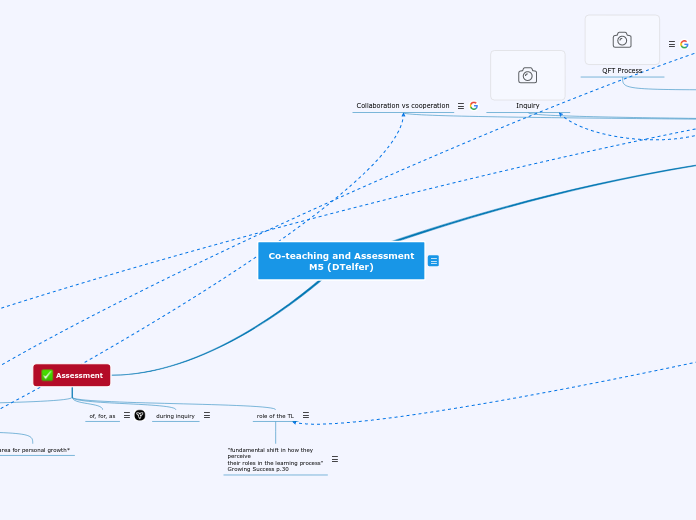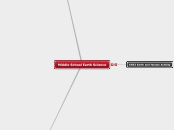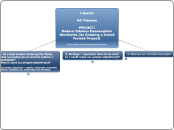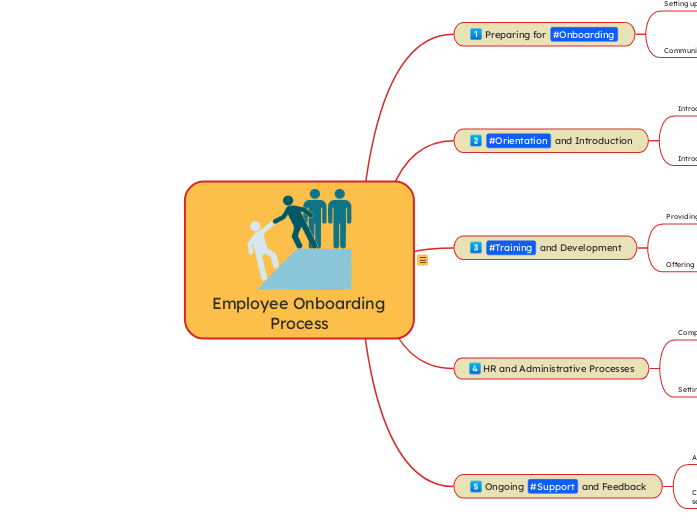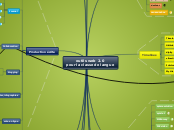Co-teaching and Assessment
M5 (DTelfer)
This web is a compilation of my key thoughts an understandings from the course readings. Several of the notes also include links to resources from my personal collection.
Assessment
role of the TL
Some of the most successful assessment situations in my career have involved teacher moderation. This could be a great way for TLs to support assessment.
"fundamental shift in how they
perceive
their roles in the learning process"
Growing Success p.30
This shift should affect the TL as well as the classroom teacher. Teachers no longer need to control the whole process. We really need to consider the gradual release of responsibility and allow our students to take the lead on their own learning experiences.
during inquiry
I feel that TLs can be very supportive during the Inquiry process in terms of assessment. Being able to conference with students and share notes with the classroom teacher to support throughout the process would be highly effective. I feel that we could also be involved in the final assessment of a culminating task.
of, for, as
Important to revisit the Growing Success document to continue to refine our understanding of assessment.
Feedback
*area for personal growth*
collaboration can lead to increased opportunities for feedback for students.
using tech to support
audio feedback tools exist
as well
comments on a google doc
Co-Teaching
Ways to support
organizing research
evaluating sources
digital citizenship
This should be an ongoing. Is too often approaches once and then not revisited. Here is a respository of resources from our board which can be used by others.
http://tvdsb.libguides.com/digitalcitizenship--teachers_students_parents/home
citing sources
Virtual Spaces
It's important that we think of ways for our students to collaborate in a virual way. In a google board this can begin with something as simple as a shared google doc. If you wish to make it more public, a padlet is a great way to collaborate.
social media
padlets
google apps
shared docs
classroom
sites
21st Century Learning
Found on Edugains website, the document on 21st Century Competencies is important for TLs to consider when they look at their co-teaching practices.
http://www.edugains.ca/resources21CL/About21stCentury/21CL_21stCenturyCompetencies.pdf
Questioning
TLs can support in
modelling good techniques
dialogue with students to learn more
about a topic and also to assess
Higher/Lower Order
I also appreciated this resource from WRDSB in regards to higher/lower order questions. I especially like that this is a public facing page that can be used by students to support their work. Our board has a Virtual Library Learning Commons - I would like to add a section on questions.
https://llc.wrdsb.ca/learning/research-process/research-questions/
QFT Process
For the past two years, my team at work has worked with groups of teachers to encourage the use of QFT (Question Formulation Technique) in relation to inquiry and the use of technology to enhance learning in the classroom. This technique can help students to ask better questions - focus on things that are open-ended and cannot be googled to find an answer. Below is a link to our presentation resource.
https://docs.google.com/presentation/d/1ReFTBTD6lm3Ht0wdqMYmPq-PtIUOOM9KE53JJanAAFg/edit?usp=sharing
Inquiry
Collaboration vs cooperation
I found this very interesting from Loertscher and Koechlin:
Cooperative - invitational approach - Teacher invites teacher-librarian to add value to teacher’s assignment (e.g. teaching search skills) or teacher-librarian develops an invitational lesson (e.g. providing book talks)
Collaborative – deliberate approach – Both teachers partner to co-design, teach and assess a learning experience that infuses high think, information literacy and technology boosts.
How many of us feel we are collaborating when we are still in the cooperative phase? How can we move to collaboration instead?
